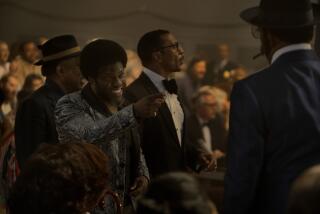Floor Show Is All That They Want
In the old days, during the week of a heavyweight championship fight, the overheated imaginations of the press agents would be working overtime.
The champ, at his camp in the mountains, would save someone from drowning, rescue a damsel from a team of runaway horses or help stamp out a forest fire.
If the champ was a prohibitive favorite, rumors would circulate that he looked terrible in training. A sparring partner had floored him. Another sparring partner had been dismissed from camp for making him look bad.
Even a rumor that the fix was in could, incredibly, hype the gate. One of the great misconceptions of the fight game is that the likelihood of a crooked fight could wreck the gate. Not so.
In 1933, New York was alive with the whisper that the Primo Carnera-Ernie Schaaf match was in the bag, as the expression had it in those days. Schaaf would take a dive, the wise guys snickered. Carnera belonged to the mob. It was Grade B movie stuff.
The public broke down the doors to see the putative tank job. When Schaaf went down and was counted out from seemingly harmless punches, the crowd booed and threw chairs. “Fake!” they shouted.
Ernie Schaaf couldn’t hear them. He was busy dying.
The likelihood was that the damage was done in a previous fight with Max Baer, in which Schaaf was knocked unconscious in the 10th and final round but “saved” by the bell. Encephalograms were not part of the fight picture in those days, but Schaaf might have entered the ring with a swollen or bleeding brain. He probably should not even have had a fight with his wife that night.
You have only to look at wrestling to see that prearrangement does not deter the dyed-in-the-wool fan, only the unwelcome guardians of public morals, the kind of people who ban books. They get short shrift in the fight business.
The trick is to make your match historically exceptional--the “Battle of the Century” syndrome.
The late Tex Rickard did this better than anyone since. But sometimes he was afraid he had overplayed his hand.
When he promoted Jack Dempsey against Georges Carpentier, the French fighter was a romantic, popular figure, a war hero, a boulevardier, a pompadour-haired pug whose nickname was, of all things, The Orchid Man. He weighed about 170 pounds, trained on wine--and, maybe, women and song--and the only surprising thing is that Dempsey didn’t kill him.
Rickard got away with it, but when he matched Dempsey against Luis Angel Firpo, he suddenly had a qualm of conscience.
Firpo was billed as the Wild Bull of the Pampas, but he was more like a big ox. Rickard was afraid he might not last much past the introductions. He went to Dempsey to plead that the champ carry this clumsy Argentine for a few rounds. Dempsey didn’t carry anyone. A newspaperman, Paul Gallico, had gotten in the ring with him once as a stunt. Dempsey split his lip.
Dempsey tore into Firpo, too. Rickard covered his eyes, but it was the best thing that could have happened. Firpo, who couldn’t have caught a bus, could handle something that ran right into him. He knocked Dempsey into the seats. Dempsey came back to floor him eight or nine times, the last one for a 10 count, but never again did Tex Rickard worry that Dempsey would embarrass him.
It’s also a misconception that the fight mob feels cheated by a short fight. On the contrary, fight fans detest a 15-round gavotte. Give your average bloodthirsty ringsider a choice between Mike Tyson-Michael Spinks and Tyson-Bonecrusher Smith and he will opt for the 91-second fight every time.
A knockout brings contentment to your average aficionado. He doesn’t want a pitchers’ battle, a scoreless tie. Give him a skillful, scientific, manly-art-of-self-defense fistfight and he’ll start to sing, “Let Me Call You Sweetheart” by the third round.
But give him a mismatch where one guy is rubber-legged and bleeding from both eyes and helpless, and he’s out of his seat with joy, yelling, “Looka that eye! Get it! Kill ‘im!” Joe Louis’ bum-of-the-month campaigns used to sell out.
A publicists’ staple when he had a one-sided fight to sell was to find a former champion who would come out publicly in favor of the underdog. Joe Louis backed more losers than the Democratic National Committee.
The fight at the Las Vegas Hilton next Saturday night needs Joe Louis. Or it needs the challenger to foil a plot to hold up a train or a casino or rescue orphans from a burning building.
On the face of it, Mike Tyson vs. what’s-his-name?, the British challenger, looks as one-sided as a flood. If it’s a fight, so is a duck hunt. Frank Bruno, the challenger, would have a better chance on the Titanic.
Tex Rickard would be a nervous wreck. But Don King, our fearless promoter here, needn’t worry. The public doesn’t shun a one-sided fight. How many times has Hollywood remade Custer’s Last Stand? The burning of Atlanta sells.
The fight fan is like the opera fan. He wants everyone to die by the third act. The credo of the dedicated fight fan was summed up by the giant fat man who sat behind me once at a particularly galling clinch-and-jab epic at the Olympic Auditorium. He stood this in growing indignation for several rounds, then rose up in wrath, shook his fist at the ring and demanded, “Somebody knock somebody down!”
More to Read
Go beyond the scoreboard
Get the latest on L.A.'s teams in the daily Sports Report newsletter.
You may occasionally receive promotional content from the Los Angeles Times.










